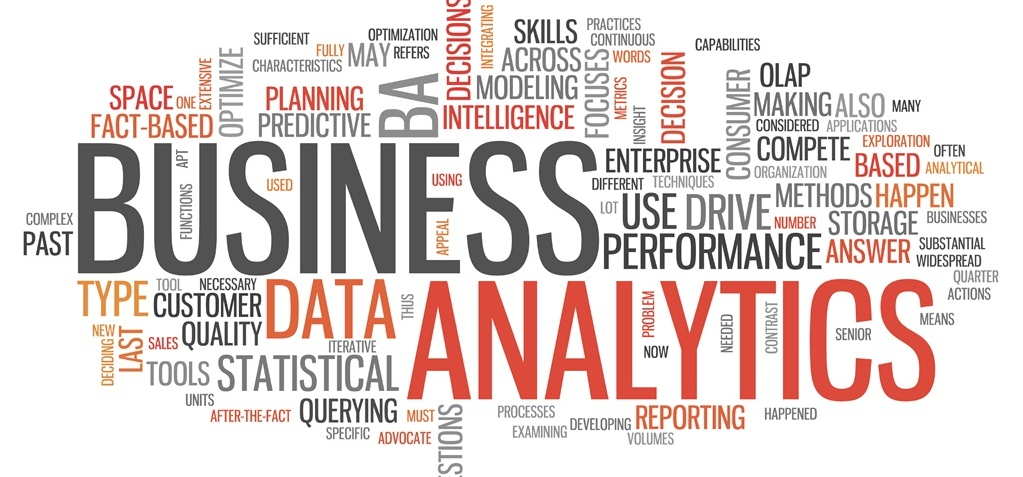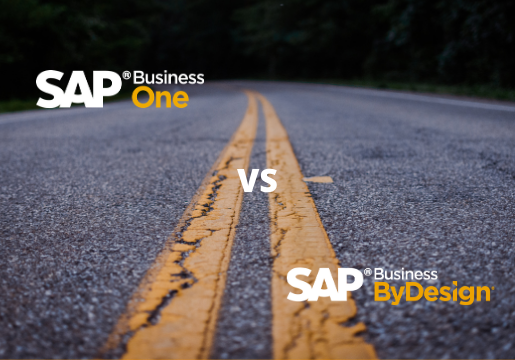Have you ever wondered why you need managed IT services for your business? In this current digital era, relying on a trusted partner to handle your IT needs is more crucial than ever.
As a small and medium enterprise (SME), you may be tempted to handle your IT needs in-house or on an ad-hoc basis. But doing so can lead to inefficiencies, security risks, and missed opportunities to leverage technology for growth.
The outsourcing industry experienced a significant growth in 2023 and is expected to thrive even more in 2024 as the demand for efficient and effective business processes continue to increase.
According to Outsource Accelerator, the platform generated 1,817 phone consultations, 1,787 toolkit downloads, and 16,763 quotation requests. This has led to it generating role requests for 55,610 full-time jobs, with an estimated value of $1,668,300,000*.
In this post, we'll explore the key reasons why engaging a managed IT service provider (MSP) is a smart investment for your business. From proactive maintenance and expert support to enhanced security and strategic guidance, an MSP can help you optimise your IT infrastructure and achieve your goals.
Whether you're struggling with outdated systems, concerned about data breaches, or simply want to free up time to focus on your core business, managed IT services could be the answer. Keep reading to discover how partnering with the right provider can transform your SME's technology landscape and drive success.
Is IT Outsourcing For Your Business? The Answer Is Yes. Click Here To Find Out Why.
Why SMEs Need Managed IT Services Now More Than Ever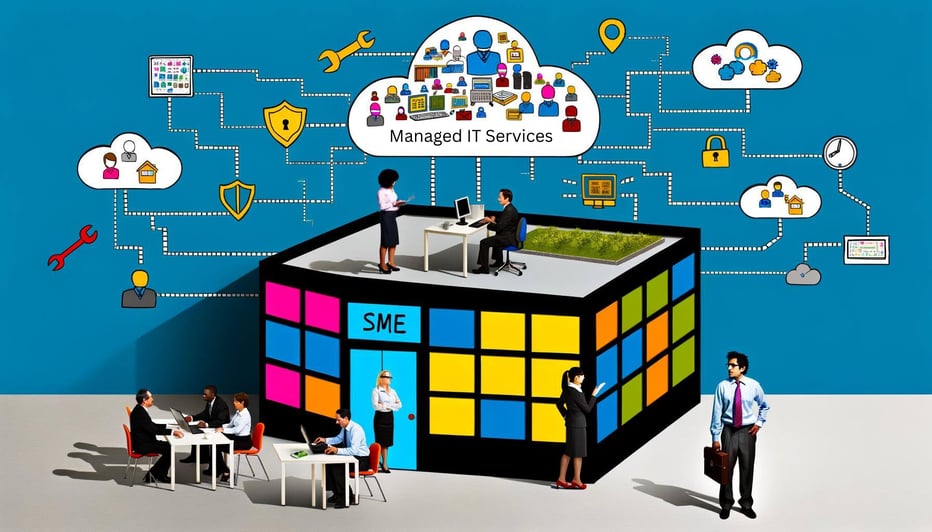
The COVID-19 pandemic has accelerated digital transformation for businesses of all sizes. SMEs in particular have had to quickly adapt to remote work, online collaboration, and digital customer engagement. In this new reality, having reliable, secure, and efficient IT systems is more critical than ever.
Here are some key reasons why SMEs should consider managed IT services now:
1. Supporting Remote Work
As the trend of remote work continues to grow, SMEs must prioritise the security and productivity of their distributed workforce. With employees accessing company resources from various locations and devices, it's crucial to implement robust security measures and provide the necessary tools to ensure seamless and secure remote operations.
MSPs can play a vital role in helping SMEs navigate the challenges of remote work. By leveraging their expertise and resources, MSPs can assist in setting up and managing secure remote access infrastructure, such as virtual private networks (VPNs) and cloud-based services. They can also provide guidance on implementing role-based access control and other access management tools to ensure that only authorised individuals can access sensitive data.
Moreover, MSPs can recommend and deploy collaboration platforms that enable seamless communication and teamwork among remote employees, helping to maintain productivity and efficiency.
2. Protecting Against Cyberthreats
The rapid shift to remote work has significantly increased the attack surface for many organisations, exposing them to a wide range of cyberthreats. With employees accessing company resources from various locations and devices, the risk of falling victim to phishing attacks, malware infections, and data breaches has grown exponentially.To mitigate these risks and protect their remote workforce, MSPs can offer a comprehensive suite of security solutions, including advanced threat detection systems, endpoint protection, and secure remote access tools, to safeguard company data and systems. Additionally, MSPs can provide employee training and awareness programs to help staff recognise and avoid phishing attempts and other social engineering tactics. In the event of a security incident, MSPs can also assist with rapid response and remediation, minimizing the impact on the organisation.
3. Enabling Business Continuity
The COVID-19 pandemic has underlined the critical importance of business continuity and disaster recovery planning for SMEs. In the event of unprecedented disruptions, many businesses struggled to adapt and maintain operations, highlighting the need for robust strategies to mitigate risks and ensure resilience. SMEs, in particular, often lack the resources and expertise to develop comprehensive continuity plans on their own, leaving them vulnerable to the impact of unexpected events.By partnering with MSPs, SMEs can leverage the expertise of the latter to help develop and implement effective business continuity solutions. This includes setting up cloud backup systems to ensure data is securely replicated and can be quickly restored in the event of a disaster.
MSPs can also assist in designing failover mechanisms that allow for seamless switching to backup systems when primary components fail, minimizing downtime and disruption. Furthermore, MSPs can work with SMEs to create detailed emergency response plans that outline clear procedures for managing and recovering from various crisis scenarios.
Key Benefits of Managed IT Services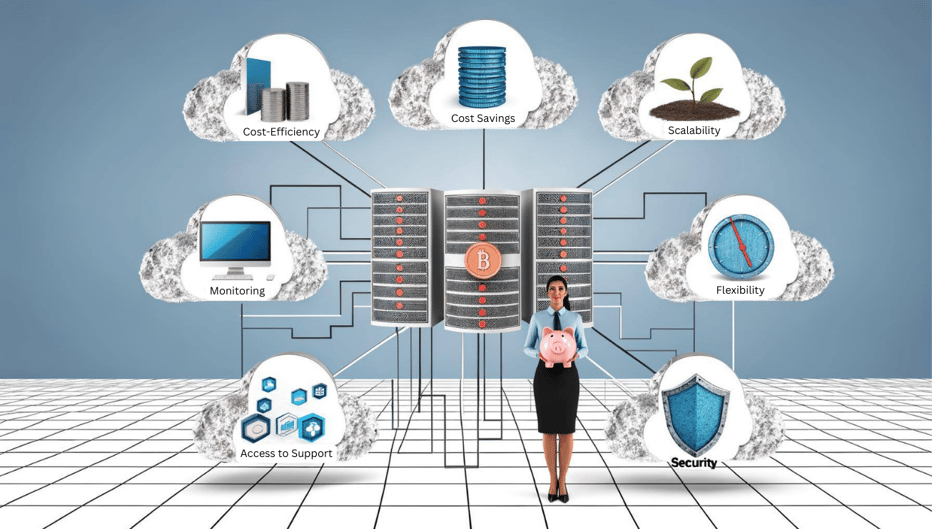
Entrusting IT infrastructures with an MSP, SMEs can unlock a range of benefits that not only optimise their IT operations but also drive business growth and success.
Let’s explore the top five benefits of managed IT services and how they can help SMEs streamline their operations, reduce risks, and achieve their business objectives with greater ease and efficiency.
1. Cost Savings and Predictable Budgeting
Outsourcing IT functions to an MSP can significantly reduce the financial burden on SMEs. Building and maintaining an in-house IT team requires substantial investments in recruitment, salaries, benefits, and ongoing training. These costs can quickly add up, straining the limited resources of SMEs.
By partnering with an MSP, businesses can access a team of skilled IT professionals without the need to hire, train, and retain them directly. This approach allows SMEs to allocate their resources more effectively and focus on their core competencies, while still benefiting from expert IT support.
Furthermore, MSPs often provide predictable pricing models, such as fixed monthly fees or service packages, which can greatly simplify budgeting and cost control for SMEs. With a clear understanding of their IT expenses, businesses can better plan their financial resources and avoid unexpected costs associated with managing IT in-house.
This predictability is particularly valuable for SMEs operating with tight budgets, as it enables them to allocate funds more strategically and maintain greater financial stability.
2. Proactive Maintenance and Monitoring
MSPs employ cutting-edge tools and technologies to proactively monitor your IT systems around the clock. These tools allow MSPs to identify potential issues, such as hardware failures, network anomalies, or security breaches, before they escalate into more severe problems. By continuously monitoring system performance, resource utilization, and other critical metrics, MSPs can detect and address concerns in real-time.
This proactive approach enables them to take corrective actions swiftly, often resolving issues before they impact business operations. As a result, SMEs can benefit from a more stable and reliable IT infrastructure that supports their day-to-day activities seamlessly.
Proactive maintenance is another key advantage of partnering with an MSP. By regularly assessing and optimizing IT systems, MSPs can prevent potential breakdowns and extend the lifespan of technology assets. This includes tasks such as installing software updates, patches, and security fixes, as well as performing routine hardware maintenance and upgrades.
By keeping systems up-to-date and well-maintained, MSPs help SMEs minimise the risk of downtime, which can be costly in terms of lost productivity, revenue, and customer trust. Moreover, proactive maintenance can improve overall system performance, ensuring that applications run smoothly and efficiently.
3. Access to Support and Expert Knowledge
MSPs have teams of skilled IT professionals with deep expertise that possess a wide range of specialised skills, spanning various technologies such as network infrastructure, cybersecurity, cloud computing, data management, and more. By tapping into this extensive expertise, SMEs can effectively bridge the gaps in their own IT capabilities and ensure they have the right support for their unique business requirements.Collaborating with an MSP allows SMEs to leverage this knowledge base on an as-needed basis, without the burden of maintaining a large in-house IT team. Whether it's troubleshooting complex technical issues, implementing new solutions, or providing strategic guidance, SMEs can rely on their MSP's expertise to navigate the ever-evolving technology landscape.
This access to a diverse skill set empowers businesses to tackle challenges more efficiently, adopt best practices, and make informed decisions about their IT infrastructure. Moreover, MSPs often foster a culture of continuous learning and knowledge sharing within their teams, ensuring that you benefit from the latest industry insights and innovations.
4. Enhanced Security and Compliance
MSPs can implement robust cybersecurity measures to protect your SME's data and systems from threats. They stay up-to-date with the latest security best practices and technologies, such as firewalls, intrusion prevention systems, and encryption, to create a strong defensive perimeter against potential attacks. Additionally, they work with you to develop comprehensive security policies, conduct regular risk assessments, and provide employee training to mitigate risks associated with human error and social engineering tactics.Beyond implementing technical controls, MSPs also help you navigate the complex landscape of regulatory compliance. Many industries, such as healthcare, finance, and government, have strict data protection and privacy regulations that organisations must adhere to. Failure to comply with these standards can result in significant fines, legal liabilities, and reputational damage.
MSPs possess the expertise to guide you through the compliance process, ensuring that their IT infrastructure and practices align with the relevant frameworks, such as HIPAA, PCI-DSS, or GDPR. By leveraging their knowledge and resources, businesses can reduce the risk of non-compliance and demonstrate their commitment to protecting sensitive data. This not only helps you avoid costly penalties but also enhances customer trust and provides a competitive edge in the respective markets.
5. Scalability and Flexibility
MSPs have the ability to scale IT services up or down based on the evolving needs of your business. As your business grows, undergoes seasonal fluctuations, or shifts its strategic direction, MSPs can quickly adapt their support to ensure that your IT infrastructure always aligns with your current requirements.
This flexibility allows you to avoid the risks and costs associated with overinvesting in IT resources during periods of low demand or being caught unprepared when your business experiences sudden growth or change. By leveraging the scalability of managed IT services, you can optimise your IT spend and maintain a lean, agile operation that responds effectively to market dynamics.
What to Look for in a Managed IT Service Provider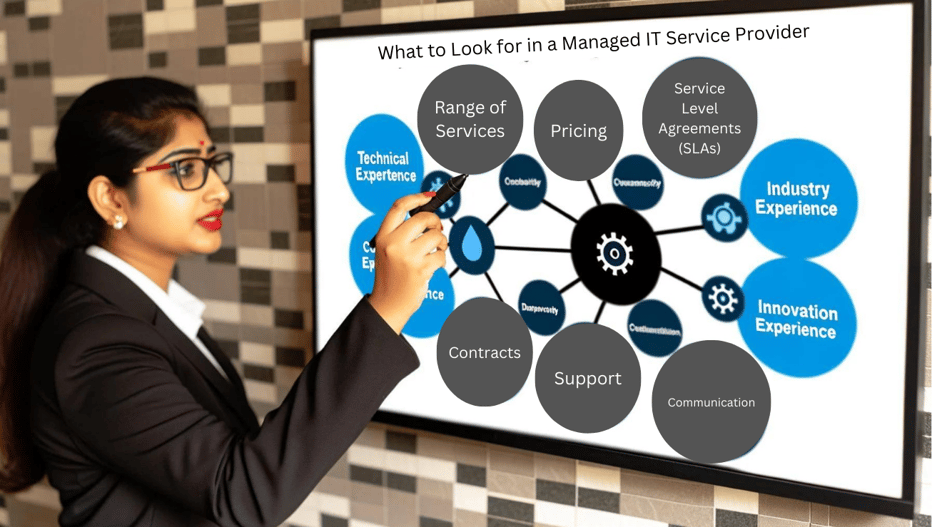
Choosing the right MSP is crucial to realizing the benefits of managed IT services. The right MSP can serve as a trusted partner, helping businesses optimise their IT infrastructure, enhance security, and drive growth. Here are some key factors to consider when evaluating potential providers:
1. Experience and Expertise
Look for an MSP with a proven track record of serving businesses in your industry and of similar size. MSPs that have experience working with organisations like yours will have a better understanding of your unique challenges, regulatory requirements, and market dynamics. They can leverage this knowledge to provide tailored solutions and best practices that align with your specific needs and goals. Additionally, an MSP that has successfully served clients in your industry can offer valuable insights and recommendations based on their past experiences, helping you avoid common pitfalls and optimise your IT operations for maximum efficiency and effectiveness.Check that they have deep expertise in the technologies and systems you rely on, such as specific software, cloud platforms, or compliance requirements. For example, if your organisation heavily utilises Microsoft Azure or requires adherence to HIPAA regulations, it's important to select an MSP that has deep knowledge and experience in these areas. An MSP with the right technical expertise can ensure that your systems are properly configured, optimised, and secured, while also providing guidance on how to leverage these technologies to drive innovation and growth.
2. Range of Services
It is essential to carefully assess the breadth and depth of the MSP’s service offerings. A comprehensive suite of services that covers the full spectrum of your IT needs can provide significant value and convenience. Look for an MSP that offers a wide range of solutions, including network management, cybersecurity, cloud computing, data backup and recovery, application support, and strategic IT consulting. By partnering with an MSP that can serve as a one-stop-shop for your IT requirements, you can streamline your vendor management, ensure seamless integration between different services, and benefit from a holistic approach to your technology strategy.Moreover, it's crucial to consider not only your current needs but also your future goals and potential growth. As your business evolves, your IT requirements are likely to change and expand. Partnering with an MSP that offers a flexible and scalable service portfolio can ensure that you have the necessary support and resources to accommodate your growing needs. For example, if you anticipate moving more workloads to the cloud, adopting new applications, or expanding your geographic footprint, choose an MSP that has the expertise and capabilities to support these initiatives.
3. Service Level Agreements (SLAs)
SLAs are crucial documents that define the level of service you can expect from the MSP, laying out the metrics by which service is measured, as well as remedies or penalties should the agreed-upon service levels not be achieved. Pay close attention to the specifics of the SLA, such as response times for different levels of support requests, resolution timeframes, and uptime guarantees for critical systems. Ensure that these commitments align with your business requirements and that the MSP's promised service levels are sufficient to keep your operations running smoothly.However, it's not enough to simply take the MSP's word for it. To have confidence in their ability to deliver the promised service levels, it's crucial to verify that the MSP has a track record of consistently meeting or exceeding their SLA commitments. Ask for references from existing clients and inquire about their experiences with the MSP's responsiveness, problem resolution, and overall service quality. Request information on the MSP's historical performance metrics, such as average response times, time-to-resolution statistics, and system uptime percentages. By validating the MSP's ability to deliver on their SLAs, you can have greater assurance that they will be a reliable partner who can keep your IT operations running efficiently and effectively.
4. Pricing and Contracts
It is crucial to have a clear understanding of the MSP’s pricing structure. MSPs typically offer various pricing models, each with its own advantages and considerations. Common models include per-user pricing, where the cost is based on the number of users supported; per-device pricing, which charges based on the number and type of devices managed; and tiered pricing, where different service levels or packages are offered at different price points. Assess these models carefully to determine which one aligns best with your organisation's needs and budget, considering factors such as scalability, cost predictability, and flexibility to adjust services as your requirements change.In addition to the pricing model, it's essential to thoroughly review the MSP's contract terms. Pay close attention to any minimum commitments, such as required contract length or minimum number of users or devices. Be aware of potential out-of-scope charges, like fees for additional services, after-hours support, or onsite visits. Understand the cancellation policies, including early termination fees or notice periods required. Clarity on these terms is crucial to avoid unexpected costs and ensure a smooth partnership. If any terms are unclear or raise concerns, seek clarification before signing the contract. A reputable MSP should be transparent and willing to explain their terms in detail.
5. Support and Communication
Evaluate the MSP's support processes, including methods of contact, hours of availability, and escalation procedures. An ideal MSP should offer multiple communication channels, such as phone, email, and a dedicated portal, allowing for convenient and efficient communication. Their hours of availability should align with your business needs, ensuring timely response and resolution.
Additionally, a robust escalation procedure is essential for addressing critical issues promptly. Look for an MSP that provides clear escalation paths, regular status updates, and a dedicated account manager who serves as a single point of contact. Proactive communication, regular reporting, and transparency should be hallmarks of their service delivery model.
By carefully assessing MSPs based on these criteria, SMEs can find a partner that will provide the expertise, reliability, and value they need to succeed with managed IT services.
SMEs Can Fully Focus on Growing Their Business with Managed IT Services
By partnering with a reliable managed service provider (MSP), SMEs gain access to cutting-edge technology, proactive maintenance, and round-the-clock support without the burden of managing an in-house IT team.
This approach will not only reduce costs, but also enhances security and compliance. With a trusted MSP handling their IT infrastructure, SMEs can allocate more resources to innovation, customer service, and growth initiatives.
Managed IT services provide the peace of mind and technological foundation SMEs need to thrive in today's digital landscape, empowering you to fully focus on achieving their business goals.
At AFON IT, we possess the IT expertise and technology to manage your IT functions at an affordable rate. We also invest heavily in keeping up-to-date on industry best practices, which makes us a good choice as a partner to co-source your IT needs to.
If you happen to be needing an MSP you can trust, do give us a call at +65 6323 0901 or schedule a free consultation with us today to find out what we can do for you.
If you've enjoyed the content in this article, do subscribe to our blog for more of these insights. Click on the image below to do so, and gain new insights from our blog posts published every week.



